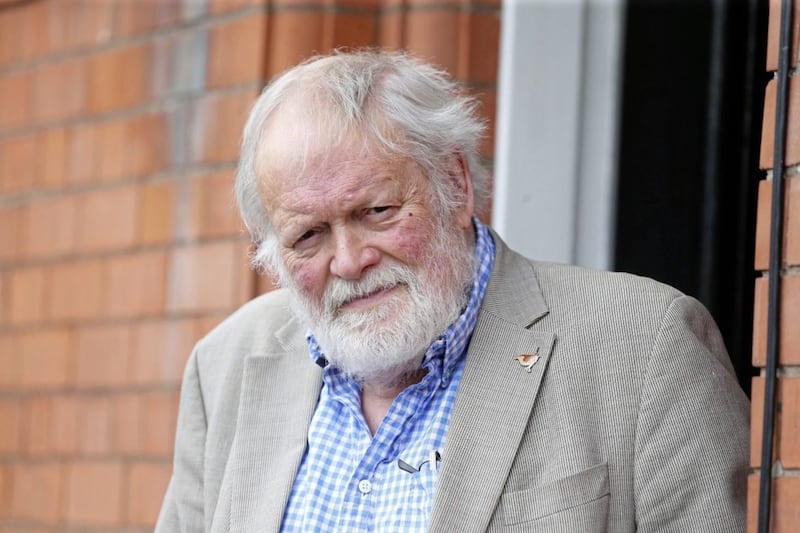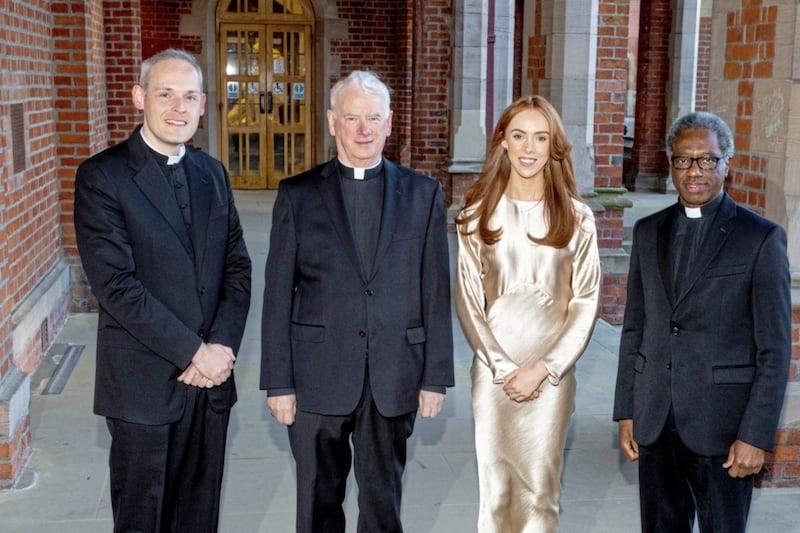CELEBRATED Belfast poet Michael Longley is graciously contemplating senectitude and declares it "extraordinary" that he has now reached the grand old age of 81.
He seems surprised at his advancing years, particularly since over the past six months he has written more poetry than he would normally pen over the course of two or three years.
“The last six months of my life have definitely been among my richest yet,” he says from his home in Belfast to which he has just returned following family birthday celebrations in his “soul landscape” – and long-time holiday spot – Carrigskeewaun in Co Mayo.
“It is a very mysterious thing, but since Christmas I have written about half of a new book. It’s been very, very exciting, really, as it’s been one of the fruitful periods of my life as scribbler. I said somewhere once that I have no idea where poems come from and if I knew, I’d go there – well, since Christmas, I haven’t had to venture out of Osborne Gardens…"
So, like a good wine, he continues to improve with age? “Well, we won’t tempt fate, you know….” begins the multi-award-winning octagenarian, before having an apparent change of heart and adding: “Yes, let’s be bold, let’s be bold and say I’m getting better… and I’m still learning.”
Longley’s 81st birthday, as it happens, preceded the launch of his 12th poetry collection – his new book is published this week (Cape Poetry) entitled The Candlelight Master, dedicated to his wife, the literary critic and cultural commentator Edna Longley.
Described as a chiaroscuro collection of light and shade, The Candlelight Master hones in on such diverse topics as flowers, grandchildren, war, art, violence and old age, with oblique references to the poets of ancient Greece and Rome – a recurring theme for the "amateur scholar" who read Classics at Trinity College, Dublin.
“A running theme is nature and flowers and birds,” says Longley whose “heart stops” on seeing a little wild flower or hearing birdsong in his “Garden of Eden” in Co Mayo. “The birds, especially the birds of Co Mayo, I regard as my soul mates,” he says. “In Mayo, there was a skylark soaring in the sky, singing, and that gives me such a thrill. In a way, that is the pulse of this book.
“Also, most poets don’t live long enough to have grandchildren – there aren’t many poems in the English language about grandchildren – and, in a way, one of the richest things for me – and I hope it’s conveyed in the book – is listening to what my grandchildren say and sometimes incorporating that into a poem.”

Yet, for all its birds, flowers and grandchildren, there is a melancholy running through The Candlelight Master, whether in references to the Holocaust – Ravensbrück and its roll call of naked, women prisoners –the Great War (as in Glossary, about his father, an “old soldier remembering the trenches”) or, in Flower Names – an updated epitaph to Constable John Larmour, shot dead by the IRA as he worked in an ice cream parlour on Belfast’s Lisburn Road in 1988.
In reference to the latter, Longley’s original poem The Ice-cream Man brought great comfort to the Larmour family and the poet still cherishes a ‘Thank you’ letter signed: 'The Ice-cream man’s mother, Rosetta Larmour'.
“She wrote me this most beautiful letter, thanking me for the poem, and her letter means more to me than all the good reviews I’ve ever received rolled together,” he confides. “I still keep in touch with George Lamour, the ice-cream man’s brother, and it means an enormous amount to me that my poem was of some use and helped the Larmour family in their sorrow.
“I often get letters from people saying they like my poems and that they helped them after the loss of a loved one, a husband or a wife, and that is very fulfilling to be told that. I do believe there is no future for poetry unless it looks into the shadows – the shadow of bereavement, the shadows of death, the shadows of violence, you know? And I think I’ve managed to do that.”
I ask him about Echo, the shortest entry in the new collection but one of the most powerful for all of its two lines:
People are like shadows to me
And I am like a shadow.
Is that how he sees himself now, at 81 – as a shadow?
“That’s actually borrowed from a wonderful painter called Gwen John and I put it in the book after a couple of poems about the Holocaust when I was thinking about the millions of people who just disappeared,” he explains. “I was also struck by the fact that when people die, in a way they disappear. But those lines are meant to be suggestive and mysterious. The book is quite melancholy, I know, but I am 81 and I’m on the home straight, if you like.”
Yet, apart from sometimes walking with a stick, Michael Longley is holding up well and says life is still full of surprises.
“The birds in the garden – I have feeders out for the birds – they surprise me every day,” he enthuses. “And in the back garden we have a couple of rare orchids and where they came from, I’ve no idea, but what a beautiful surprise! In the same way, a poem is born out of excitement and surprise – if I’m not excited and surprised by a poem when it comes into my head, no-one else is going to be excited or surprised either.
“The most important thing for me is the rhythm, but in a good poem you will also have a beautiful balance between melody and meaning – these two come together to produce something which, at various levels, makes sense, but which you can’t easily paraphrase.
“When I was a teacher, the kids used to say, ‘But, Sir, what does it mean?’, maybe in reference to [Shelley’s] To a Skylark or [Keats's] Ode to a Nightingale – and I would say, “Well, actually, it means everything…”
As well as teaching, he worked with the Arts Council of Northern Ireland for 20 years – the first 10 of which he enjoyed and the second 10… he casts around for a diplomatic euphemism… were “blighted by office politics”. There were 10 years during which he wrote nothing, he says, due to a mixture of things, “including the male menopause, if you like, as well as the office politics”, but he is happy that he has since more than made up for the extended lapse.
Life remains “very full” for this former Ireland Professor of Poetry who lists his other passions as botany, ornithology, classical music, jazz and lately, cooking – lamb curry becoming a favourite in the Longley household during lockdown.
Content with life and with his poetry, I wonder if awards and critical praise are still as important to someone in their 80s and on the ‘home straight’ as he calls it? “Oh yes!” laughs Longley deeply and unapologetically. “They’re like oxygen and when one comes along, I inhale very deeply. I can’t get enough.”
The Candlelight Master is published by Jonathan Cape and is in the shops now.








